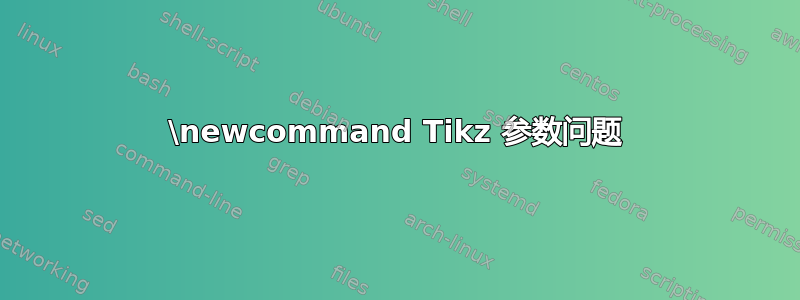
我有这两个命令来在图上从 y 读取 x 或从 x 读取 y。
问题在于标签是 180:#3,其上方位置位于 #3 东侧位置。
愿望(不太重要):如何将两个命令合并为一个?
\newcommand{\ReadY}[3][180]{%
\draw[very thin, dashed] (axis cs:#2,0)|-(axis cs:0,#3) coordinate (Y) ;
\node[small dot,pin=#1:#3] at (Y) {};
}
\newcommand{\ReadX}[3][270]{%
\draw[very thin, dashed] (axis cs:0,#2)-|(axis cs:#3,0) coordinate (Y) ;
\node[small dot,pin=#1:#3] at (Y) {};
}
须更正为:
\newcommand{\ReadY}[3][180]{%
\draw[very thin, dashed] (axis cs:#2,0)|-(axis cs:0,#3) coordinate (Y) ;
\node[small dot,pin={[pin position={#1}]{#3}}] at (Y) {};
}
\newcommand{\ReadX}[3][270]{%
\draw[very thin, dashed] (axis cs:0,#2)-|(axis cs:#3,0) coordinate (Y) ;
\node[small dot,pin={[pin position={#1}]{#3}}] at (Y) {};
}
可以将这两个命令合并为一个吗?
我是说 :
第一个参数是最佳角度,
第二个是我知道的价值
函数给出的值中的第三个,并在图上显示为红色(图像或先行项)
标签必须位于这个节点上。
最小示例:
\documentclass{standalone}
\usepackage{pgfplots}
% boite de couleur avec un filet autour
\tikzset{%
boxcolor/.style args={#1}{%
fill=#1!25!white,rectangle,rounded corners=4pt,font=\footnotesize,draw=#1},
small dot/.style={fill=black,circle,scale=0.3}}
\newcommand{\ReadY}[3][175]{%
\draw[very thin, dashed] (axis cs:#2,0)|-(axis cs:0,#3) coordinate (Y) ;
\node[small dot,pin={[boxcolor=green,pin position={#1}]{%
\pgfmathprintnumber[use comma]{#3}}}] at (Y) {};
}
\newcommand{\ReadX}[3][265]{%
\draw[very thin, dashed] (axis cs:0,#2)-|(axis cs:#3,0) coordinate (Y) ;
\node[small dot,pin={[boxcolor=green,pin position={#1}]{%
\pgfmathprintnumber[use comma]{#3}}}] at (Y) {};
}
\begin{document}
\begin{tikzpicture}
\begin{axis}[xmax=2,xmin=-2,ymin=-2,ymax=2,
axis x line=center, axis y line=center]
\node[below left] at (axis cs:0,0) {\footnotesize $0$};
\ReadX{.5}{.5} ;
\ReadY{1}{1.5} ;
\end{axis}
\end{tikzpicture}
\end{document}
感谢 Peter Grill,他提供了更多选项,甚至还有 en node 来在要点本身上放置一些内容:
\NewDocumentCommand{\ReadXY}{%
D<>{green}% [#1] first color
o%% [#2] = optional parameters x pin
% (no x pin if no angle provided, which is the default)
m% % {#3} = x value (mandatory paramater)
D<>{green}% [#4] second color
o%% [#5] = optional parameters for y pin
% (no y in if no angle provided, which is the default)
m% % {#6} = y value (mandatory paramater)
}{%
\draw[very thin, dashed] (axis cs:#3,0) coordinate (ReadX)%
|- (axis cs:0,#6) coordinate (ReadY) ;
% new node on the point
\coordinate (ReadXY) at (axis cs:#3,#6) ;
%
\IfValueTF{#2}{%
\node[small dot,pin={[boxcolor=#1,pin position={#2}]
{\smash[b]{\pgfmathprintnumber[use comma]{#3}}}}] at (ReadX) {};
}{}%
%
\IfValueTF{#5}{%
\node[small dot,pin={[boxcolor=#4,pin position={#5}]
{\smash[b]{\pgfmathprintnumber[use comma]{#6}}}}] at (ReadY) {};
}{}%
}%
答案1
我不能 100% 确定我理解您的意思,但是这应该可以让您了解如何将命令组合成一个命令。
下面的宏\ReadXY有两个可选参数,分别为x和y引脚角度。如果未指定角度,则不标记该坐标。因此,这个宏允许您有四种可能的组合:
- 标签盒
x和y - 标签仅有的这
x, - 标签仅有的和
y - 标签两者都不坐标,只需画出线条:
如图所示:

代码:
\documentclass{standalone}
\usepackage{pgfplots}
\usepackage{xparse}
\usepackage{xstring}
\tikzset{%
boxcolor/.style args={#1}{%
fill=#1!25!white,rectangle,rounded corners=4pt,font=\footnotesize,draw=#1},
small dot/.style={fill=black,circle,scale=0.3}}
\NewDocumentCommand{\ReadXY}{%
O{}% [#1] = optional parameters x pin (no x pin if no angle provided, which is the default)
O{}% [#2] = optional parameters for y pin (no y pin if no angle provided, which is the default)
m% {#3} = x value (mandatory paramater)
m% {#4} = y value (mandatory paramater)
}{%
\IfStrEq{#1}{}{}{%
\draw[very thin, dashed] (axis cs:0,#4)-|(axis cs:#3,0) coordinate (Y) ;
\node[small dot,pin={[boxcolor=green,pin position={#1}]
{\pgfmathprintnumber[use comma]{#3}}}] at (Y) {};
}%
%
\IfStrEq{#2}{}{}{%
\draw[very thin, dashed] (axis cs:#3,0)|-(axis cs:0,#4) coordinate (Y) ;
\node[small dot,pin={[boxcolor=green,pin position={#2}]
{\pgfmathprintnumber[use comma]{#4}}}] at (Y) {};
}%
}%
\begin{document}
\begin{tikzpicture}
\begin{axis}[xmax=2,xmin=-2,ymin=-2,ymax=2,axis x line=center, axis y line=center]
\node[below left] at (axis cs:0,0) {\footnotesize $0$};
\ReadXY[-120][-160]{0.75}{1.0};% <--- Label BOTH x and y
\ReadXY[45][]{1.25}{1.4};% <--- Label ONLY x
\ReadXY[][20]{-1.5}{-1.7};% <--- Label ONLY y
\end{axis}
\end{tikzpicture}
\end{document}


